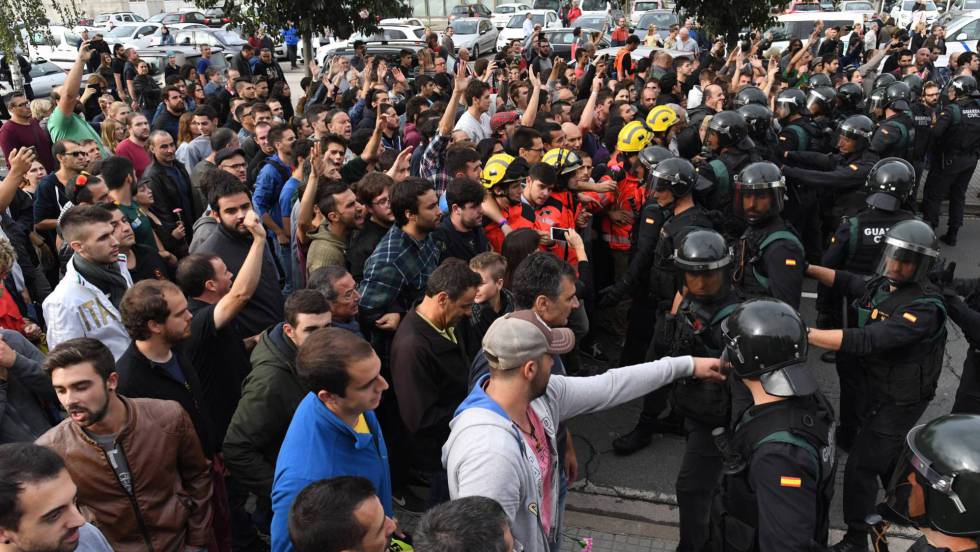In contrast, events become evidence of the wisdom in not affording autonomous regions too much autonomy lest ingrown, political arrogance come to believe itself independent. The actions of Puigdemont and company are thoroughly regressive in their lack of solidarity with that Spain with which they intimately share culture as, for example, more people in Catalonia identify as Castilian (Spanish) speakers rather than Catalan speakers (Institut d'Estadística de Catalunya) - not that the language issue is paramount.
Moreover, one should not underestimate the enrichment and practical value of having a national identity and belonging alongside a regional.
The following article from El Pais says it all.
_____________________________________
El Pais, 10/04/17, https://elpais.com/elpais/2017/10/03/inenglish/1507025584_438952.html
What is really happening in Catalonia?
The independence leaders left the referendum in the hands of the general population, who had to face the police response alone
While the images of the Spanish police charging at Catalan voters on Sunday are worthy of serious attention, they need to be put in context if we are to understand just what has happened in Spain and in the European Union over the past few days. Which is what I aim to do here as briefly as possible.
Police in Catalonia were not acting on the orders of the central government but of the judiciary
The first thing to take into account is that the police were not acting on the orders of the central government but of the judiciary. The police were preventing an independence referendum from taking place on the orders of a judge because it was decided that it violated the Constitution, which does not recognize the right of an autonomous region to take a unilateral decision to break away.
It’s true that the words “right to self-determination” and “right to decide” sound reasonable in the kinds of modern democracy that exist in the US or Europe, but they have to be placed within each country’s legal framework.
The independence activists have been claiming the right to hold a referendum for years but the implications of such a measure have to be taken into account. The most serious one is that they would consider a ‘yes’ vote binding and that would affect all Catalans, even those who feel Spanish. How many Catalans feel Spanish? In the last elections, the Catalan pro-independence parties (the Junts pel Sí coalition and the radical CUP party) got 1,975,348 votes out of a census of 5,510,798. In other words, of all the Catalans with the right to vote in Catalonia, 35% opted for one pro-independence party or another.
On several occasions, the independence activists have tried to hold a negotiated referendum such as in Scotland and Quebec. However, the dominant political parties in Spain have said no. The center-right Popular Party, which is currently in power in the central government, argues that a referendum on self-determination is illegal, among other things because Catalonia already is almost totally self-governing as it is.
The Catalans already manage their own prison system, their police, education and health. As far as the treasury is concerned, they control tax collection while the redistribution of public funds is controlled by the central government. Generally speaking, Catalonia is one of the most autonomous regions in the whole of Europe.
The other main party in Spain, the opposition Socialist Party (PSOE), believes that a referendum should be held involving all Spaniards, not just the Catalans. In other words, it believes that Congress should agree to reform the 1978 Constitution in a way that would turn the Spanish regional system into a federation of states and that this should be voted on nationally. Up to now, the PP has resisted putting this option to the Catalan leaders.
If Catalonia declared independence, Spain as we know it would cease to exist
What is true is that if Catalonia declared independence, Spain as we know it would cease to exist, given that there are other regions such as the Basque Country and Galicia with powerful nationalist movements that would probably follow their lead.
Also to be taken into account is the systematic persecution of both major parties by the terrorist organization ETA that killed 829 people – including numerous teachers, politicians and policemen – in the name of Basque nationalism from 1958, when Franco was still in power, until 2010.
Catalonia has never been an independent state. It was part of the Kingdom of Aragon when Aragon joined the Kingdom of Castile in the 15th century. It shares a language and culture with other autonomous regions – Valencia and the Balearic Islands. Many pro-independence leaders propose that these other regions should join Catalonia to make the ‘Països Catalans,’ something unlikely to happen given that these other regions feel strongly Spanish.
Faced with the refusal of PP and the Spanish Prime Minister, Mariano Rajoy, to entertain a referendum in Catalonia, in August the independence activists passed a law enabling them to hold a referendum unilaterally and another in which the process of proclaiming a republic is laid out in detail. In this vote, the parties opposing independence, which hold 63 of the 135 seats, abstained from voting and the central government put the matter in the hands of the Constitutional Court, which ordered the police to prevent the referendum from going ahead.
Catalonia’s leaders left the referendum in the hands of the general population, who had to face the police response alone
The central government could have resorted to Article 155 in the Constitution, which allows it to assume the powers of the Catalan regional government in the event it is disobeyed. But it didn’t.
Various warnings were issued in the run-up to the referendum appealing to the pro-independence leaders to call it off. They were called to order by the central government, the socialist opposition and even by US President Donald Trump as well as the president of the European Commission, Jean Claude Juncker. All the above expressed respect for the law and the Spanish Constitution.
Despite this, Catalan leaders decided to press on with their agenda. They said the vote would take place. They published the census on internet. They chose the schools that would act as polling stations. They allowed groups of volunteers to conceal the ballot boxes and organize the vote. Various pro-independence voters organized pajama parties with children in the schools in order to occupy them.
In short, Catalonia’s leaders left the referendum in the hands of the general population, who had to face the police response alone. What could be better for these pro independence leaders than images of unrest and policemen seizing ballot boxes by force, which is exactly what happened?
EL PAÍS stands with the Constitution and proposes returning to the letter of the law to solve the current crisis.
Catalonia has its own police force, the Mossos de Esquadra, which is now under investigation for disobedience. It was under the orders of the Constitutional Court to vacate the schools – to go to each school and make sure the vote didn’t take place. The heads of the Mossos de Esquadra claimed they did that, but the footage from Sunday shows a different story. They turned up at the schools, handed over a piece of paper and left.
Which is why the National Police and Civil Guard were sent in, only to be met by human barricades, a number of which were broken up by force.
Armed with the resulting images, the pro-independence leaders have maintained that there were almost 900 injured and are requesting the EU and the UN to intervene against Spanish authoritarianism. According to Jordi Sànchez, President of the National Catalan Assembly (ANC): “There hasn’t been this number of injuries since the Second World War.”
What actually happened was that the local health services tended to 893 people, most of whom had suffered a panic attack or a minor injury of some kind. So the figure was exaggerated. There was only one serious hospital case and that was due to a heart attack. Another was admitted to hospital with an eye injury. According to the Spanish government, 33 policemen were injured in the course of duty.
It is untrue, as the Catalan leaders claim, that this is the worst violence in Europe for decades. There are some very recent examples that are far worse, such as the crackdown on crowds protesting against the G20 summit in Hamburg last May when hundreds were injured by police using tear gas and water cannons. In France, 2005, three civilians died and almost a thousand were injured in clashes with police; not to mention the repressive measures employed by various governments, such as the Hungarian government, acting against immigrants trying to cross their country to get to Germany, injuring hundreds.
It’s important to add that the party that now leads the pro-independence coalition has been in power for decades in Catalonia and, according to recent findings, is guilty of setting up illegal funding systems via illegal commissions of 3% on public projects. Many of their leaders, including the former president, Jordi Pujol, are either under investigation or already in prison.
EL PAÍS is a newspaper that emerged after the death of the dictator Franco. It spoke of the need to defend a constitutional democracy in Spain. During the attempted coup in 1981 while tanks were crawling up the streets and the military police in control of Congress, its front page read: “EL PAÍS stands with the Constitution.” Now EL PAÍS still stands with the Constitution and proposes returning to the letter of the law to solve the current crisis. Let the various political parties agree on an amendment to the constitution that is voted on by the country as a whole so that people have the right to decide in a free, equal and democratic manner.
English version by Heather Galloway.




